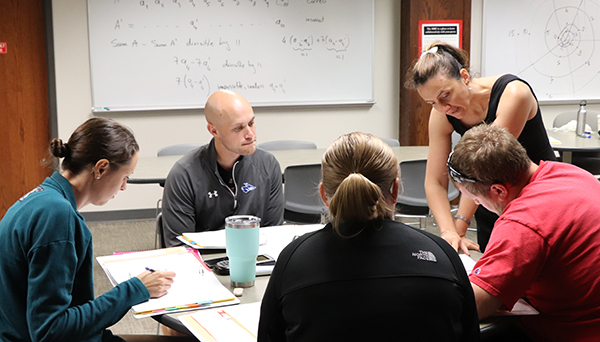
Planning to take a graduate course this summer to continue your professional development or to get one step closer to earning your master’s degree? Do you need additional graduate hours in mathematics or science in order to be eligible to teach dual-enrollment courses at your high school? Registration opened Monday, March 4, for summer courses at Nebraska.
(Note to returning students: It's possible that MyRED has assigned you an enrollment date depending on your current status so please take note of that if you are not able to register right away on Monday.)
To enroll in UNL graduate courses, follow the steps outlined on the Nebraska Math and Science Summer Institutes website, http://scimath.unl.edu/nmssi . This year we are offering 25 courses across the state and online to meet your professional development needs. Check out our course catalog, which supplies the needed class numbers for MyRED. For all in-person NMSSI courses, current Nebraska teachers automatically qualify for a tuition fellowship from UNL equal to 20 percent of resident, graduate tuition. The NMSSI Fellowship Application will open soon at http://go.unl.edu/scimathapply . As last year, paid lunches are not included in the courses this summer.
Courses to take note of this year, and their primary audiences, are:
*Math 896: Complex Valued Functions and Calculus for Teachers (grades 9-12 teachers)
*Math 805T: Discrete Mathematics (grades 6-12 teachers)
*TEAC 890: Responsive Instruction in the Mathematics Classroom (grades 3-6 teachers)
*GEOS 898: Nebraska Geology Through Time (K-12 teachers – also counts as an elective for math’s MAT degree)
COURSE DESCRIPTIONS:
Math 896 - Complex Valued Functions and Calculus for Teachers (Class # 9148)
June 17-21, 8 a.m. to 5 p.m.
Location: 13 Avery Hall, UNL City Campus
Instructor: Gordon Woodward, Mathematics, emeriti professor, UNL
This course is about analytic geometry, functions, mappings, and calculus set in the beautiful, two-dimensional world of complex numbers. It is a visually and mathematically rich environment in which to gain a deep understanding of these topics. Differentiation and integration will be investigated in this context. Software such as GeoGebra and others will be used to enhance visualizations.
Math 805T – Discrete Mathematics (Class # 6884)
July 15-19, 8 a.m. to 5 p.m.
Location: 13 Avery Hall, UNL City Campus
Instructor: Yvonne Lai, Mathematics, UNL
Designed to deepen knowledge of discrete mathematics as it relates to topics covered in middle through high school curricula. Course topics (such as graph theory and counting techniques) are introduced through "hands-on" explorations through which various problem-solving strategies are emphasized.
TEAC 890: Responsive Instruction in the Mathematics Classroom (Class # 9101)
July 15-19, 8 a.m. to 5 p.m.
Location: Omaha
Instructor: Matt Timm, Omaha Public Schools
The new Nebraska state and Common Core standards for mathematics are based largely on learning progressions. Thus, the aim of this course is to familiarize elementary teachers with mathematical learning progressions related to topics spanning the elementary grades (through grade six). The course will utilize frameworks based on extensive research which divide student strategies into categories based on learning progressions (sometimes called learning trajectories). These categories provide teachers with a way to teach responsively by utilizing formative assessment of student thinking to design "next steps" to advance and deepen student understanding.
GEOS 898: Nebraska Geology Through Time
July 8-12, 8 a.m. to 5 p.m. (Class # 3260)
Location: 109 Bessey Hall, UNL Campus
Instructor: Cara Burberry, Earth and Atmospheric Sciences, UNL
This course is a one-week tour through key events in the geologic history of Nebraska. We will begin 1.8 billion years ago, with the mountain-building events that created the oldest rocks in Nebraska. Subsequently, we will step through time in chronological order, taking a couple of half-day field trips to look at ~300 million-year-old rocks within easy driving distance of Lincoln. The course includes a tour of the paleontology displays in the State Museum, learning in detail about the Highway Paleontology program and Nebraska's Cenozoic Megafauna. We will finish with an overview of relatively recent (~5 million year) geomorphologic and geologic process in Nebraska, so that students are equipped to incorporate a Nebraska-based examples into a variety of learning modules.
Contact Lindsay Augustyn at laugustyn2@unl.edu with any questions.
:::::::::::::::::::::::::
Be a lifelong learner.
Center for Science, Mathematics & Computer Education
http://scimath.unl.edu/nmssi